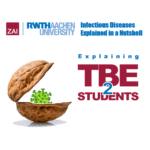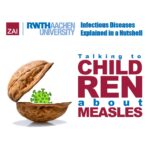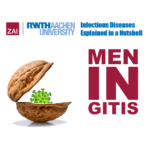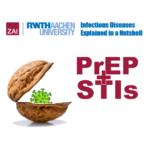Schlagwort: ‘transmission’
Ebola Outbreak: A Global Concern and Lessons Learned for a Resilient Future
Disclaimer!
This article and its major media content are produced by students to train science communication as part of a lecture about human infectious pathogens. The article does not represent official advice from the authorities. For authorized information about the disease in question, please refer to the official health authorities in your country or the World Health Organization.
By Kerstin Lehnen and Lena Rocca
Introduction
In recent headlines, the Aachener Newspaper has highlighted a concerning development – the reemergence of Ebola in the Democratic Republic of Congo. In this article, we embark on a journey to understand the historical context of the virus, particularly the devastating outbreak from 2014 to 2016. We will also delve into the current situation in Congo, exploring the characteristics of the Sudan Ebola virus responsible for the recent outbreak. Along the way, we will provide valuable resources, including an engaging video by science influencer SciFluencis* and an enlightening podcast hosted by Sciencefacts*. Get ready to uncover the global impact of Ebola and the invaluable lessons we’ve learned along the way.
The Devastating Outbreak of 2014-2016
Between 2014 and 2016, West Africa experienced the longest and largest Ebola outbreak in history. Originating in Guinea in December 2013, the virus rapidly spread across borders, resulting in over 28,600 reported cases and a tragic death toll of 11,325. Although Germany didn’t directly witness any cases, travelers infected with the virus introduced it to the country. Through international collaboration, enhanced disease surveillance, and effective treatment measures, the epidemic was eventually brought under control.
The Current Ebola Outbreak in Congo
On August 21, 2022, the Ministry of Health of the Republic of the Congo reported a new Ebola outbreak. Confirmed through rigorous medical tests, the outbreak persisted from August 21 to September 27, 2022, with 164 reported cases. Among them, 142 cases were confirmed, while 87 patients successfully recovered and 55 tragically lost their lives. The Sudan Ebola virus was identified as the cause, posing a challenge as there are currently no approved therapeutics or vaccines for this strain.
Unraveling the Sudan Ebola Virus
Belonging to a group of six Ebola virus species, the Sudan Ebola virus is a rare but life-threatening infectious disease. Originating in wild animals, the virus is transmited to humans through contact with infected animals. Human-to-human transmission primarily occurs through physical contact with Ebola patients or deceased individuals. The virus spreads mainly through bodily fluids, necessitating robust containment and prevention measures.
Expanding Your Knowledge
To gain a deeper understanding of Ebola and its implications, we recommend exploring additional resources. SciFluencis*, renowned science influencers, have produced a captivating video titled „What is Ebola?“ that offers an in-depth explanation of the virus:
—
Furthermore, in our quest to understand the global preparedness and response efforts, we turn to the enlightening podcast hosted by Sciencefacts*. In this thought-provoking podcast episode, hosted by Laura* and Julia*, university students in the field of infectious diseases shed light on the progression of an Ebola infection:
—
Conclusion
The resurgence of Ebola in Congo serves as a powerful reminder of the persistent threat posed by this deadly virus. Yet, by embracing international collaboration, bolstering disease surveillance, and advancing treatment and prevention strategies, we can strive to minimize its impact. Our collective commitment to learning from past outbreaks and staying informed through credible resources enables us to contribute to global efforts in tackling Ebola and safeguarding public health.
Let us remember that knowledge and awareness are our greatest weapons against infectious diseases like Ebola. By staying informed and working together, we can build a future resilient to such global health challenges. Stay informed, stay safe, and join us in our pursuit of a healthier world.
*fictious characters
About the authors:
 Lena Rocca
Lena Rocca
Age 23, 2nd semester Biology M. Sc., major: Medical Life Science
 Kerstin Lehnen
Kerstin Lehnen
Age 22, 1st semester Biology M. Sc., major: Neurobiology






